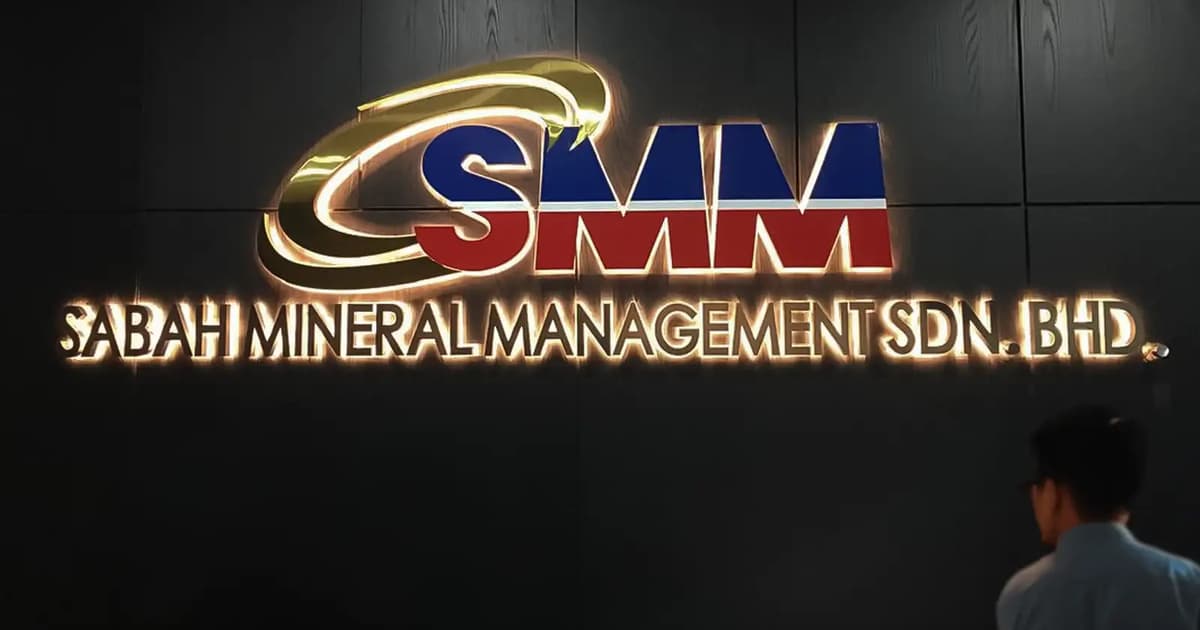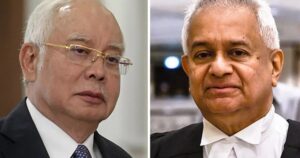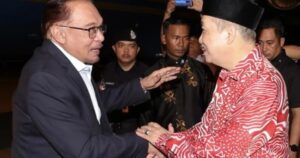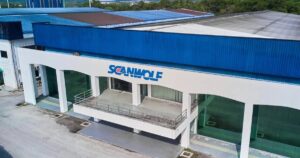
From Roger Chin
In recent months, Sabah Mineral Management Sdn Bhd (SMM) has found itself at the centre of political and public controversy.
Commentators, news portals and social media voices have questioned its role, legitimacy and power – particularly in the context of mineral licensing.
Accusations have ranged from misconduct to claims of political manipulation. But in the rush to assign blame, fundamental facts have been lost.
SMM is not a secretive gatekeeper. It does not issue mining licences, approve them or profit from them. It is not a commercial miner.
It is a government-owned coordination agency created to bring order, integrity and structure to Sabah’s mining sector — a sector long marred by unregulated claims, opportunism and jurisdictional confusion.
Before SMM was established, applications for mining and prospecting licences in Sabah were handled by a patchwork of departments, often with limited coordination and varying standards.
This created fertile ground for speculative land grabs, poor documentation, overlapping land claims and disputes that harmed investor confidence and state interests alike.
Recognising this, the Sabah government formed SMM as a centralised, professionally managed, state-owned company to act as a one-stop agency. It was not to replace legal processes, but to ensure they are followed properly.
SMM exists to serve the public interest by:
- screening and processing licence applications;
- coordinating due diligence and inter-agency input;
- ensuring that only qualified, credible applicants proceed; and,
- protecting Sabah’s land, environment, and sovereignty from misuse
What SMM actually does
SMM operates under the legal framework of the Mining Ordinance 1960, which governs all mineral-related activity in Sabah. Under Section 6 of that Ordinance, the chief minister alone holds the legal authority to grant mining or prospecting licences.
SMM has no such power. It is not a licensing authority.
Instead, SMM plays a role before the licence stage. When a prospecting application is submitted – whether to the Chief Minister’s Office, the Sabah Natural Resources Office (Pejabat Hasil Bumi Sabah), or directly to SMM – the application eventually comes through SMM for vetting.
SMM’s process includes verifying the applicant’s financial standing, technical capacity and local participation.
It coordinates with other state departments, including:
- the Sabah lands and surveys department (JTU);
- Pejabat Hasil Bumi;
- the Sabah forestry department; and,
- preparing reports and materials for its board of directors, who include senior officials, and is chaired by the chief minister himself.
One key strength of SMM’s governance structure is the presence of a board of directors, which allows for greater flexibility and depth in decision-making.
Unlike rigid ministerial structures, a board can include subject matter experts from outside the civil service – such as geologists, legal professionals, industry practitioners or community representatives. They bring specialised insight not always available within government departments.
This broadens the state’s capacity to assess applications and policies, based on real-world knowledge, technical competence and independent judgement.
If the board is satisfied, it may grant the applicant “permission to apply”.
This does not mean a licence is granted. It simply means the application is cleared to be formally submitted to JTU for statutory processing.
This is further subject to the applicant submitting all required documents and meeting all stipulated conditions within the given timeframe, failing which the permission to apply for a prospecting licence will be revoked/cancelled.
JTU then consults other technical agencies. If there are no objections, the matter is passed to the Pejabat Hasil Bumi, which makes a recommendation to the chief minister.
Only after all this can a licence be issued – with the chief minister’s express approval.
Understanding prospecting and mining licences
There is a fundamental distinction between a prospecting licence (PL) and a mining lease (ML), often overlooked in public discussions.
A PL merely grants the holder permission to explore a defined area for potential mineral resources. It does not confer any right to extract or commercially mine minerals.
Prospecting is investigative in nature, involving geological surveys, soil sampling and test drilling. Only if sufficient mineral deposits are confirmed, and all regulatory and environmental standards are met, can the holder apply for a mining lease.
This distinction is critical because prospecting must be completed before any mining can legally begin. It is not an automatic pathway to mining. In fact, statistics from Sabah and other jurisdictions consistently show that fewer than 5% of PLs are ever converted into MLs.
Most prospecting efforts do not result in economically viable discoveries, environmental approvals or government endorsement for mining.
Moreover, when a mining lease is eventually issued, it is significantly smaller in area than the original prospecting licence. This is by design.
A PL’s purpose is to allow a wide survey area to identify where minerals may exist.
But once confirmed, a mining lease is granted only for the specific zone where extraction is feasible and justifiable — usually a fraction of the PL’s original footprint.
It is also worth noting that prospecting involves substantial costs and commercial risk, borne entirely by the applicant. This includes geological work, environmental assessments, technical studies and compliance obligations – often running into millions of ringgit with no guarantee of success.
From the state’s perspective, this represents a low-risk approach to mineral sector development.
The state incurs no financial cost or liability during the prospecting phase, but gains key advantages: most importantly, the data collected during prospecting belongs to the state.
This is especially significant given that only about 30% of Sabah’s land area has been explored or prospected in the past, mainly by the federal department of minerals and geoscience (JMG), and even then the state does not own that data.
The current licensing process is therefore a way for Sabah to reclaim ownership of its geological data, expand knowledge of its mineral potential, and begin to systematically explore the remaining 70% of land area for which little or no data currently exists.
Finally, while the state bears no cost during prospecting, it becomes directly involved at the mining stage. If and when a mining lease is approved, the state participates through royalties, fees, land use payments and, in some cases, equity participation.
This ensures the commercial benefits of resource extraction flow back to the people of Sabah, but only once the necessary diligence, safeguards and approvals have been completed.
Misunderstanding ‘permission to apply’
A great deal of confusion has arisen from SMM’s letters stating that a company has been given “permission to apply” for a PL. These are often misrepresented as proof that a licence has been granted or promised. They are not.
Such letters are procedural notifications, confirming that SMM’s internal checks are complete and that the application may now enter the government’s formal decision-making pipeline.
The process is still ongoing. A licence may still be denied, for example, if land overlaps are discovered, environmental objections arise or government policy changes.
This misunderstanding has allowed some applicants to claim approvals that do not legally exist, fuelling public distrust and institutional confusion.
SMM and Sabah’s rights over resources
SMM also serves a deeper political and constitutional purpose. Under the Malaysia Agreement 1963, Sabah has rights over land and natural resources.
The creation of SMM is consistent with that entitlement. It reflects the state government’s intent to exercise greater control over how its resources are managed, and by whom.
Rather than rely entirely on federal departments or fragmented state units, Sabah has taken steps to build its own administrative capacity.
In doing so, it is asserting its autonomy in practical, not just rhetorical, terms.
Why is the state assembly not involved?
Some have questioned why SMM or the licensing process does not involve the state legislative assembly. The answer is straightforward – the Mining Ordinance provides a clear executive procedure for handling applications. Licences are issued under the authority of the chief minister, via the administrative system.
The assembly plays no direct role because licensing is an executive function, not a legislative one. The system is designed to be governed by law and executed through proper administrative machinery, not political debate.
SMM’s value
As Sabah positions itself for greater economic self-determination, institutions like SMM are vital. Without them, the state risks returning to a system where licences are pursued through the backdoor, unclear processes or political favour.
SMM helps ensure that all applicants – whether local or foreign, connected or not – are subject to the same procedures, requirements and scrutiny.
This is not a barrier to investment. It is a defence of due process and, by extension, of public confidence in the rule of law.
SMM is not a mining company. It does not grant licences. It is not a political instrument. It is a structured, law-governed agency tasked with protecting Sabah’s interests in one of its most valuable sectors.
In an age of suspicion and speculation, institutions like SMM matter more than ever. They do not exist to make decisions for Sabah, but to ensure that those decisions – when made – are legitimate, lawful and in the public interest.
If we want a future where Sabah’s resources benefit its people, where applications are judged on merit and where the law matters more than influence, then we need more agencies like SMM – not fewer.
Roger Chin is a lawyer and a former president of the Sabah Law Society.
The views expressed are those of the writer and do not necessarily reflect those of FMT.






